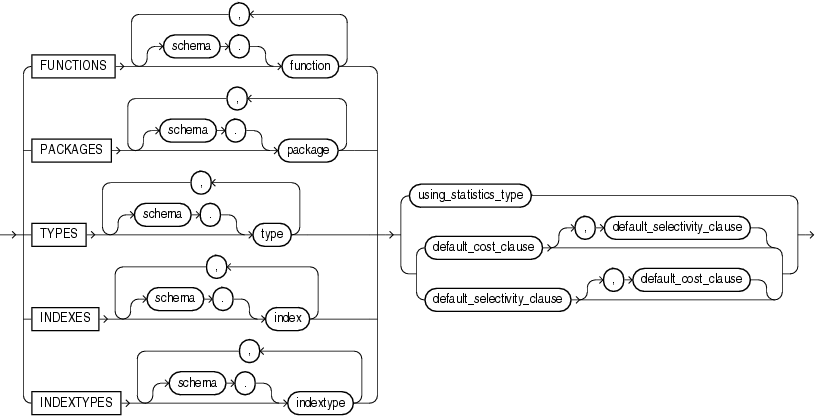| Oracle® Database SQL Language Reference 11g Release 2 (11.2) Part Number E26088-02 |
|
|
PDF · Mobi · ePub |
| Oracle® Database SQL Language Reference 11g Release 2 (11.2) Part Number E26088-02 |
|
|
PDF · Mobi · ePub |
Use the ASSOCIATE STATISTICS statement to associate a statistics type (or default statistics) containing functions relevant to statistics collection, selectivity, or cost with one or more columns, standalone functions, packages, types, domain indexes, or indextypes.
For a listing of all current statistics type associations, query the USER_ASSOCIATIONS data dictionary view. If you analyze the object with which you are associating statistics, then you can also query the associations in the USER_USTATS view.
To issue this statement, you must have the appropriate privileges to alter the base object (table, function, package, type, domain index, or indextype). In addition, unless you are associating only default statistics, you must have execute privilege on the statistics type. The statistics type must already have been defined.
See Also:
CREATE TYPE for information on defining types




Specify one or more table columns. If you do not specify schema, then Oracle Database assumes the table is in your own schema.
Specify one or more standalone functions, packages, user-defined data types, domain indexes, or indextypes. If you do not specify schema, then Oracle Database assumes the object is in your own schema.
FUNCTIONS refers only to standalone functions, not to method types or to built-in functions.
TYPES refers only to user-defined types, not to built-in SQL data types.
Restriction on function_association You cannot specify an object for which you have already defined an association. You must first disassociate the statistics from this object.
Specify the statistics type (or a synonym for the type) being associated with column, function, package, type, domain index, or indextype. The statistics_type must already have been created.
The NULL keyword is valid only when you are associating statistics with a column or an index. When you associate a statistics type with an object type, columns of that object type inherit the statistics type. Likewise, when you associate a statistics type with an indextype, index instances of the indextype inherit the statistics type.You can override this inheritance by associating a different statistics type for the column or index. Alternatively, if you do not want to associate any statistics type for the column or index, then you can specify NULL in the using_statistics_type clause.
Restriction on Specifying Statistics Type You cannot specify NULL for functions, packages, types, or indextypes.
See Also:
Oracle Database Data Cartridge Developer's Guide for information on creating statistics collection functionsSpecify default costs for standalone functions, packages, types, domain indexes, or indextypes. If you specify this clause, then you must include one number each for CPU cost, I/O cost, and network cost, in that order. Each cost is for a single execution of the function or method or for a single domain index access. Accepted values are integers of zero or greater.
Specify as a percent the default selectivity for predicates with standalone functions, types, packages, or user-defined operators. The default_selectivity_clause must be a number between 0 and 100. Values outside this range are ignored.
Restriction on the default_selectivity_clause You cannot specify DEFAULT SELECTIVITY for domain indexes or indextypes.
See Also:
"Specifying Default Cost: Example"This clause is relevant only for statistics on INDEXTYPE.
Specify WITH SYSTEM MANAGED STORAGE TABLES to indicate that the storage of statistics data is to be managed by the system. The type you specify in statistics_type should be storing the statistics related information in tables that are maintained by the system. Also, the indextype you specify must already have been created or altered to support the WITH SYSTEM MANAGED STORAGE TABLES clause.
Specify WITH USER MANAGED STORAGE TABLES to indicate that the tables that store the user-defined statistics will be managed by the user. This is the default behavior.
Associating Statistics: Example This statement creates an association for the standalone package emp_mgmt. See Oracle Database PL/SQL Language Reference for the example that creates this package.
ASSOCIATE STATISTICS WITH PACKAGES emp_mgmt DEFAULT SELECTIVITY 10;
Specifying Default Cost: Example This statement specifies that using the domain index salary_index, created in "Using Extensible Indexing", to implement a given predicate always has a CPU cost of 100, I/O cost of 5, and network cost of 0.
ASSOCIATE STATISTICS WITH INDEXES salary_index DEFAULT COST (100,5,0);
The optimizer will use these default costs instead of calling a cost function.